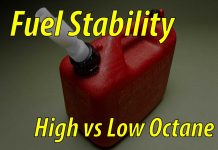How Is The Density Of Gasoline Measured?
Specific Gravity is the density difference between one substance and the density of a different substance used as a benchmark. Water is the benchmark for liquids and solids, while hydrogen or “air” being the measurement for gases.
 To find the specific gravity of a liquid, we divide the density (weight) of a fluid by the density of water. So the weight of one gallon of fuel will be divided by the weight of one gallon of water (8.325 lbs)
To find the specific gravity of a liquid, we divide the density (weight) of a fluid by the density of water. So the weight of one gallon of fuel will be divided by the weight of one gallon of water (8.325 lbs)
Let’s take standard pump gas, which weighs (roughly) 6 lbs per gallon.
So we take six divided by 8.325, which gives us the specific gravity of 0.7207 (6 ÷ 8.325 = 0.7207).
So when you compare the density of gasoline between two fuels, one is 0.720, and another is 0.730, the fuel with the smaller number is lighter.
Why Is Understanding Specific Gravity Useful?
The density of gasoline has an influence on fuel metering, primarily for carbureted motors. Heavy fuel means dense fuel. As a result of using dense fuel without making adjustments, the carburetor’s float will sit higher than intended. If the carburetor float sits too high, the float needle will close too soon, and the fuel level will be too low. So if you’re switching fuels, adjust your carburetor accordingly. (Not just the floats, the whole thing).
Specific Gravity is a Good Indicator of The Contents
For the majority of race fuels, a lower specific gravity (lighter) fuel means it will have a high burn rate. And on the opposite end, a heavier fuel will burn slow. While this is not the case every time, it’s a good rule of thumb considering light hydrocarbons burn faster than heavier ones.
Knowing what rate your fuel burns will determine how much spark advance is required to make peak power.
So when you adjust your carburetor to use a specific gravity of fuel, you will need to change your timing to match that density of gasoline to get the most out of your build.
Related: Alcohol is volatile, but does it create more octane? No… It does not…
Consider Pump Gas Consistency
You need to address the carburetor and timing factors when using pump gas too. Pump gas has a specific gravity that varies from 0.720 up to 0.770.
Remember when we talked about specific gravity reflecting a fuel’s make up? A pump gas’s composition will vary by octane, region, season, and brand. Inconsistent fuel quality is why tuning an engine on pump gas can be tricky, and you can’t get the full potential out a build. If you optimize your engine on high-quality race gas, then use pump gas, you run a high risk of engine failure.
It’s like putting ketchup on a prime porterhouse.
If you have any questions or anything to add, please leave them in the comments or on our FaceBook page!





